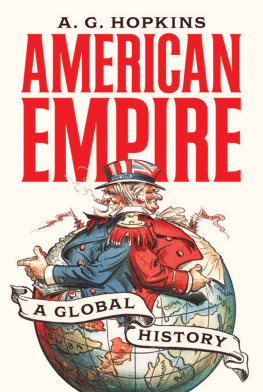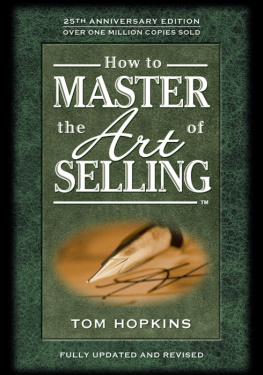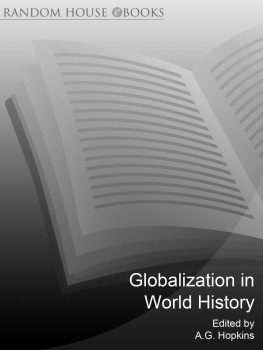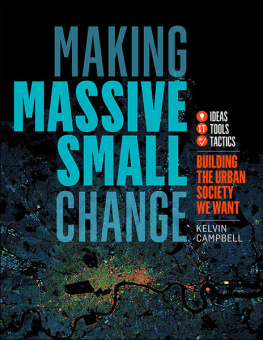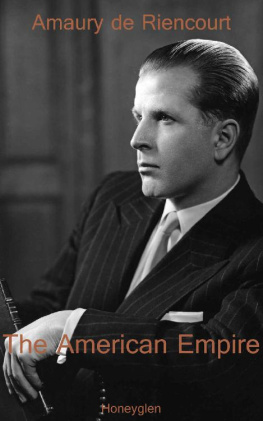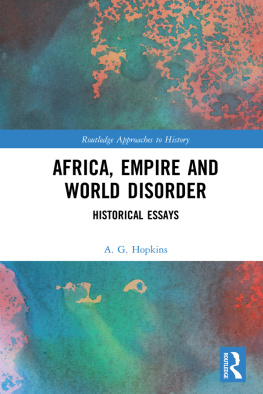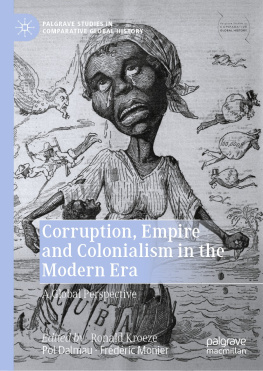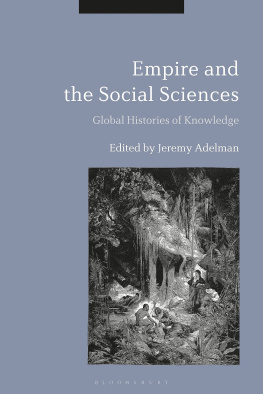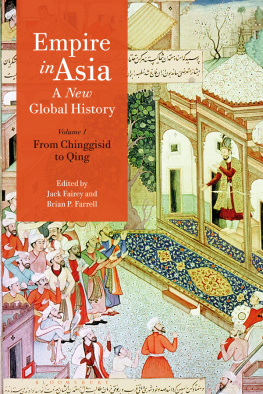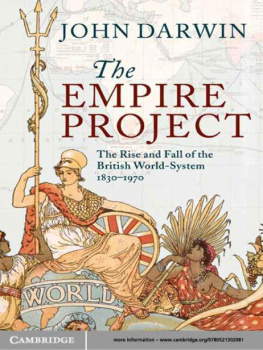Hopkins - American empire: a global history
Here you can read online Hopkins - American empire: a global history full text of the book (entire story) in english for free. Download pdf and epub, get meaning, cover and reviews about this ebook. City: United States;USA, year: 2018, publisher: Princeton University Press, genre: Politics. Description of the work, (preface) as well as reviews are available. Best literature library LitArk.com created for fans of good reading and offers a wide selection of genres:
Romance novel
Science fiction
Adventure
Detective
Science
History
Home and family
Prose
Art
Politics
Computer
Non-fiction
Religion
Business
Children
Humor
Choose a favorite category and find really read worthwhile books. Enjoy immersion in the world of imagination, feel the emotions of the characters or learn something new for yourself, make an fascinating discovery.
American empire: a global history: summary, description and annotation
We offer to read an annotation, description, summary or preface (depends on what the author of the book "American empire: a global history" wrote himself). If you haven't found the necessary information about the book — write in the comments, we will try to find it.
American empire: a global history — read online for free the complete book (whole text) full work
Below is the text of the book, divided by pages. System saving the place of the last page read, allows you to conveniently read the book "American empire: a global history" online for free, without having to search again every time where you left off. Put a bookmark, and you can go to the page where you finished reading at any time.
Font size:
Interval:
Bookmark:

AMERICAN EMPIRE

AMERICA IN THE WORLD
Sven Beckert and Jeremi Suri, Series Editors
A list of titles in this series appears at the back of the book.
AMERICAN EMPIRE
A GLOBAL HISTORY
A. G. HOPKINS
PRINCETON UNIVERSITY PRESS
PRINCETON & OXFORD
COPYRIGHT 2018 BY A. G. HOPKINS
Requests for permission to reproduce material from this work should be sent to Permissions, Princeton University Press
PUBLISHED BY PRINCETON UNIVERSITY PRESS
41 William Street, Princeton, New Jersey 08540
IN THE UNITED KINGDOM: PRINCETON UNIVERSITY PRESS
6 Oxford Street, Woodstock, Oxfordshire OX20 1TR
press.princeton.edu
ALL RIGHTS RESERVED
ISBN 978-0-691-17705-2
Library of Congress Control Number: 2017961900
British Library Cataloging-in-Publication Data is available
Acquisitions Editor: Ben Tate
Editorial Assistant: Hannah Paul
Production Editorial: Karen Carter
Jacket Illustration Credit: It Ought to be a Happy New Year, Judge magazine, 1899.
Courtesy of Billy Ireland Cartoon Library & Museum, The Ohio State University
Production: Erin Suydam
Publicity: Sara Henning Stout and Katie Lewis
Copyeditor: Karen Verde
Epigraph Credit: Brian Turner, Ashbah from Here, Bullet.
Copyright 2005 by Brian Turner. Reprinted
with the permission of The Permissions Company, Inc.,
on behalf of Alice James Books.
This book has been composed in Miller, Coliseum, and Griffon
Printed on acid-free paper.
PRINTED IN THE UNITED STATES OF AMERICA
1 3 5 7 9 10 8 6 4 2
Fired at first sight with what the Muse imparts,
In fearless youth we tempt the height of arts,
While from the bounded level of our mind,
Short views we take, nor see the lengths behind;
But more advanced, behold with strange surprise
New distant scenes of endless science rise!
So pleased at first the towering Alps we try,
Mount oer the vales, and seem to tread the sky,
The eternal snows appear already passed,
And the first clouds and mountains seem the last:
But, those attaind, we tremble to survey
The growing labours of the lengthend way,
The increasing prospect tires our wandering eyes,
Hills peep oer hills, and Alps on Alps arise!
Alexander Pope, An Essay on Criticism (1711)
CONTENTS
ILLUSTRATIONS
PHOTOS |
MAPS |
TABLES |
Total Sugar Deliveries for U.S. Consumption by |
PREFACE
This book arose from the conjunction of two decisions. The first, my own, brought me to the United States to take up a position at the University of Texas at Austin in 2001. The second, made by others then unknown, was the bombing of the Twin Towers, which occurred on the morning after my arrival. This event, subsequently known as 9/11, had minor as well as major consequences. My own response was among the smallest of the reverberations: I was drawn, like a pin to a magnet, toward the force that had brought down the Towers and riven the world. I then watched, with spectators across the globe, as the attack provoked a massive response. In March 2003, the United States invaded Iraq. At that point, and still largely against my will, I put down the work I was engaged in and turned my attention to understanding Washingtons reaction to the first assault on its continental territory since 1812.
The inquiry took me far from my starting point, which was just as well because numerous commentators, who commanded far more knowledge than I did and could write at a speed I could not match, even with artificial propulsion, had plowed through the terrain long before an outsider could reach it. I had to become a fox, as in the fable popularized by Isaiah Berlin, who knows many things, before I could hope to become a hedgehog, who knows one important thing. As I contemplated the huge, impressive, and daunting library of research on the history of the United States, it became apparent that the only possibility I had of making a contribution to the subject was by looking at it from the outside in, instead of from the inside out, while also trying to absorb elements of the national story that fitted my purpose. The resulting study has brought together, in a wholly unpremeditated way, several decades of accumulated knowledge from three diverse fields of history. My interest in globalization has supplied the broad analytical context; my work on Western empires has suggested how imperial expansion transmitted globalizing impulses; my research on the indigenous history of former colonial states, especially those in Africa, has given me an awareness of how different the world looks when viewed from the other side of the frontier.
. My remaining observation on the academic content of the project acknowledges the inherent difficulty that besets all works of synthesis: that of striking a satisfactory balance between generality and detail. George Eliot gave Edward Casaubon his big idea of finding the key to all mythologies, but knew that his procedure of sifting those mixed heaps of material, which were to be the doubtful illustration of principles still more doubtful, was irredeemably flawed. In his mercurial way, Oscar Wilde also urged writers to be bold and unconventional. He scorned timidity that held even the courage of other peoples ideas at bay, and mocked careless habits of accuracy that stifled imagination. His exhortation, however, was not accompanied by advice on the methodological discipline authors need if imagination is to serve understanding. In grappling with this problem, I have followed a conventional path in formulating a testable hypothesis, defining the terms accompanying it, and considering evidence that extends beyond simple, verifying examples. Nevertheless, the task of specifying and integrating the elements involved in the story remains a work in progress. I am neither a complete fox nor a fully formed hedgehog, but a hybrid whose capacity for further evolution has now reached its limit. If I have failed to be right about all the small things, I hope, nevertheless, to have added a degree of plausibility, and perhaps some illumination, to a few of the big ones. Truth, if it can be found, lies in another country.
My guides to the present country, the United States, have been patient, tolerant, and unreservedly generous with their knowledge. My former colleagues and associates at the University of Texas at Austin responded willingly to my appeals, even when I was no longer on site and able to exercise the power of proximity. George Forgie, Mark Metzler, Marc Palen, and James Vaughn, who took on large chunks of the manuscript dealing with the eighteenth and nineteenth centuries, carried the heaviest burdens. But I owe a great deal, too, to the specialized expertise of Frank Guridy, Mark Lawrence, William Morgan, Bartholomew Sparrow, John Vurpillat, and Ben Brower. I am grateful to the College of Liberal Arts, which gave me a Faculty Research Grant in the spring of 2007, and to the Colleges Institute of Historical Studies, which awarded me a fellowship in the fall of 2009. The leave granted for these two semesters enabled me to cut into, if not entirely through, some particularly dense problems of interpretation. The administrative staff in the Department of History were unfailingly helpful and, as is the way in Austin, always courteous in responding to requests that were often based on expectations imported from another continent.
Next pageFont size:
Interval:
Bookmark:
Similar books «American empire: a global history»
Look at similar books to American empire: a global history. We have selected literature similar in name and meaning in the hope of providing readers with more options to find new, interesting, not yet read works.
Discussion, reviews of the book American empire: a global history and just readers' own opinions. Leave your comments, write what you think about the work, its meaning or the main characters. Specify what exactly you liked and what you didn't like, and why you think so.

